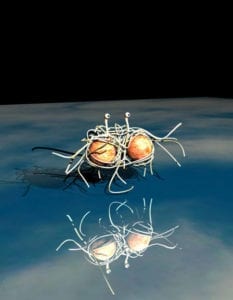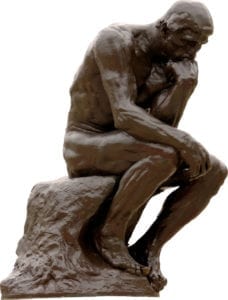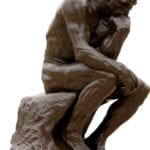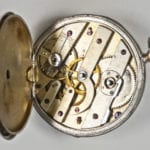
Atheism doesn’t make sense. When I saw through the illusions and delusions of the religion I was raised with, I was an atheist for a minute. But I quickly saw several problems with that position as well.
While atheism sometimes successfully deconstructs other erroneous belief systems, it’s also an erroneous belief system. It attempts to use the same tools as religion to destroy it. But that’s fighting fire with fire, and it doesn’t work. It makes grandiose claims that it can’t prove, it can be just as blindly self-serving as any other belief system, and it unsuccessfully tries to validate itself with science.

I am not about to lump all atheists into a singular category or sweepingly attribute attitudes or behaviors to all of them. There is a rainbow within the atheist demographic. There are raging, God-hating atheists and there are quiet “whatever, dude” atheists. There are atheists who have never believed in God and there are outspoken apostates. There are saintly atheists and atheists who are the scum of the earth. Ultimately, I respect them all and their fundamental right to believe as they wish as a part of their pursuit of happiness.
But they do have one thing in common: their brand of antireligion, atheism, doesn’t make sense under scrutiny.
Atheism makes claims it can’t prove
The problem with the argument in favor of the existence of God is that there is plenty of evidence but no proof.
The problem with the argument against the existence of God is that there is plenty of evidence but no proof.

It’s the ultimate unsolved mystery, a millennia-old stalemate. Simply picking a side doesn’t solve that mystery or declare checkmate. Neither side has convincingly proven one way or another whether God exists, so picking either side is ultimately an arbitrary choice.
Let’s take one of the most famous and compelling arguments in favor of God: the argument of design. Someone had to make all of this, right?
This argument is flimsy because it is based upon a mere assumption. No, someone did not have to make all of this. The universe is an unimaginably complex system wherein every element is inherently interrelated with every other element throughout space and time … but that doesn’t prove that anyone made it. It doesn’t prove that no one made it, either. In fact, it doesn’t prove anything either way. People simply leap upon this observation and take either a “yuh huh” or a “nuh uh” stance, and the merry-go-round keeps spinning.
And this leads to my next point.
Atheism is as much an ego trip as is deism
It is delusional and arrogant to believe that one understands utterly unknowable things. In face of the fact that there are hundreds of religions in 2016 America, it is blindly egocentric for someone to say that his or hers is correct and the others are all wrong. And if the argument can be made that more than one is correct, the distinction between those two is ultimately arbitrary. There can only be one; hence, war.
But simply declaring them all to be wrong is equally egocentric and just as arrogant.
 Belief is ego behavior. There has to be a believer, so the statement is always “I believe,” and “I” is a function of the ego. (And ultimately, “I” is a delusion as well, but that is beyond the purview of this piece.)
Belief is ego behavior. There has to be a believer, so the statement is always “I believe,” and “I” is a function of the ego. (And ultimately, “I” is a delusion as well, but that is beyond the purview of this piece.)
Rather than simply allowing a situation to be what it is, the ego has to assert itself upon that situation and say, “Well, here’s what’s really going on. I know it is because I say so. And I am right because I am the infallible me.” Then the rationalizing and evidentiary cherry-picking begins, usually influenced by one’s conditioning — be it ethnicity, family, peer influences, convenience, brainwashing, etc.
To believe that there is no God is just as outrageous as to believe that there is a God. They are equally hubristic outlooks that have everything to do with feeling right and nothing to do with reality itself.
Atheism is reactionary to deism
With no deism, there would be no atheism. Therefore, without God, there could be no reason to deny god. It accidentally validates deism by acknowledging it.

“I say there is a magic cricket!” “Well I say that there is no magic cricket!” Without the assertion that there is a magic cricket, how silly would it seem to leap up and proclaim the absence of a magic cricket?
If you were born into some hypothetical situation wherein you were never spoon-fed fanciful fairy-tale versions of reality, would you make them up yourself? Or would you simply live your moment-to-moment life, dealing with the present situation as it unfolds?
Atheism is simply the negating of an idea rather than an original idea itself. There is no ultimate truth to be found in mere naysaying.
Science doesn’t support atheism any more than deism
Science may dispel religion, but it does not inherently favor atheism over deism — or at least, it hasn’t yet.
Here’s what science is: a process. It’s not a religion. It has neither doctrine nor dogma. It does not pick sides. It observes impartially and walks away. It’s often portrayed as anti-religion, and indeed it has dispelled many a ridiculous religious concept. But it’s merely a procedure for questioning, not an institution or catalogue. And while it is surely a panacea for nearly all religious mumbo-jumbo, all that does is destroy the emperor’s (or empress’s) clothing — it neither proves nor disproves him … or her, or them, or us, or you, or whatever.

Along these lines, the Big Bang theory is often blown way out of proportion in this context.
Let’s remember that unlike evolution, it’s a theory — and a flawed one at that. There is a lot that simply doesn’t make sense mathematically about the first few moments after the Big Bang, nor has an actual cause been clearly defined, and they are long-standing dilemmas. And to all those hardcore Big Bang theorists out there, what if the Big Bang was nothing more than God’s version of creation? Now what? (That’s also an utterly absurd idea, but it’s an absurd conversation in the first place.)
So here’s the moment you’ve been waiting for: the solution to the atheism vs. deism dilemma.
Agnosticism.
“Gnosis” is Latin for “knowledge,” so to be agnostic is to admit that one doesn’t know. It’s to be able to see how one thrusts one’s own hopes and fears onto the world in an effort to render it more understandable — and thereby less scary.
But there is nothing comforting about making up a lie to cover an unpleasant truth, nor is it useful.
 Whereas atheism doesn’t make sense — nor does deism — agnosticism does because it establishes an honest initial outlook: I admit that there are some things that I don’t know. I admit that I do not have the resources that would enable omniscience. Therefore, regardless of what I think or believe, there are some things that I really cannot and will not know. That’s an honest statement. That said, I can now approach the world genuinely without constantly falling into delusions — a major source of suffering in life — based on my own misinterpretations.
Whereas atheism doesn’t make sense — nor does deism — agnosticism does because it establishes an honest initial outlook: I admit that there are some things that I don’t know. I admit that I do not have the resources that would enable omniscience. Therefore, regardless of what I think or believe, there are some things that I really cannot and will not know. That’s an honest statement. That said, I can now approach the world genuinely without constantly falling into delusions — a major source of suffering in life — based on my own misinterpretations.
Agnosticism is also the ultimate act of humility. To say “God, I know you” is not humble. In fact, it’s so prideful that it’s almost Satanic. It’s like watching a movie while wearing red-tinted sunglasses.
On the contrary, to say “God, you do not exist” is equally proud. It’s like watching a movie while wearing blue-tinted sunglasses.
However, to say “Maybe God exists and maybe not. I don’t know, I’m just a mammal. But it sure is a beautiful day today” is to allow reality to just be itself. It’s like watching a movie with no filter whatsoever. With the red glasses, you won’t be able to see some things that are red, and you will have a false perception of everything you see; likewise with the blue glasses.
There is no truth to be seen wearing red or blue glasses. However, to simply say “This is this” is an utterance of indisputable truth. What is this? Heck, I dunno. It’s just this. But how are you today?
 Whereas atheism doesn’t make sense because it is reactionary to deism, agnosticism bypasses the problem because “making sense” is not the point of it. It lets go of that.
Whereas atheism doesn’t make sense because it is reactionary to deism, agnosticism bypasses the problem because “making sense” is not the point of it. It lets go of that.
For these reasons, there is greater comfort in agnosticism than atheism or deism. What if “this” turns out not to be what you thought it was? What will you do? Can you let go of your attachment to your view of reality and relax into the truth? Are you living in a constant cloud of delusion and clinging because you can’t accept things simply as they are, gods or no gods?
As the Christians are fond of saying, “There is power in acceptance.” It’s so true. We will never know the real truth if we’re convinced that we’re already right. We only stop exploring and start fighting. By accepting what is rather than constantly superimposing our neurotic stories upon life, we cut through delusions and relax into the power of residing fully in the ultimate.
Isn’t that the primary goal of religion, anyway?


















LOL. The writer doesn’t even realize that the Church of the Flying Spaghetti Monster is a parody of religion. Also, atheism is a statement of disbelief. Anyone who thinks a statement of disbelief is a “belief system” is not playing with a full deck.
Also, agnosticism is not a middle position between belief and non-belief. Agnosticism is a statement about knowledge. It has nothing to do with belief. You can be an agnostic atheist or an agnostic theist. What you cannot be is just agnostic. If you take an agnostic position, you still must either believe or disbelieve in a god.
I suggest the writer do some research so that he doesn’t seem completely ignorant.
“I believe there is no god; therefore I am an atheist.” There’s an assertion there about what someone believes. The presence of a negative seems to have snagged a synapse for ya. Nor did anyone said agnosticism is a “middle position.” You made that up. I have no idea way. Agnostic deism and agnostic atheism are both oxymoronic. One can indeed quite plainly just be agnostic, and someone who can’t see something as elementary as that has no place lording over others with silly, bizarre commentary. Some people get a kick out that sort of thing, though. As a big fan of irony that can’t be made up, I get a kick out of ignorant yet arrogant people telling others to do research so that they won’t seem completely ignorant. Meanwhile, I’ll be over here, being “just agnostic” in spite of the above nonsensical assertion to the contrary. Look Mom! I’m doing the impossible!
Atheism is the lack of belief in a god. It is not the belief that there is no god. Atheism is not a belief – it’s non-belief. The fact that you don’t understand this is just one of many fatal flaws in your article. You could have avoided this and other errors if you cracked open a dictionary.
You state that you can be just agnostic. No. You can’t, because belief is purely binary – you either believe in a god, or you don’t. Anyone who thinks he can just be agnostic is attempting to fit agnosticism between belief and non-belief. You may not have said it, but that is what you’re trying to do. Otherwise you would have adopted the label of a theist or an atheist. There is no third option, and you have to be one or the other.
As for your ad hominem argument, well, I think it’s ironic that, after posting an article such as the above, you have the gall to call anyone else’s commentary “bizarre”. And maybe I am arrogant, but I’d rather be arrogant than post an article that makes me look foolish.
You may call yourself “just an agnostic”, but again the fact is, you either believe in a god, or you don’t.
Clearly, you are a very confused individual. Reading books can help with that. I suggest “Atheism for Dummies”, and maybe a dictionary can help you sort out what words like “atheist” mean.
And also, regarding your assertions about the Big Bang, I suggest you read Lawrence Krauss’s book “A Universe From Nothing”. That might also help you to look a little less ignorant.
You really don’t get it, do you? There is a difference between “I believe there is no God” and “I do not believe there is a God.” The latter is not a claim, the former is. This is very basic to anyone who has spent any time with the subject. Are you just trolling or have you made an honest effort to understand the subject?
Ian, you are spot on. In addition it is clear that the writer conflates atheism and anti-theism. I am in atheist in the same sense I am a-troll and a-fairy. I expend no time or effort attempting to deny or disprove their existence. The is no evidence to make their existence credible. In the same sense I don’t spend any time attempting to disprove god. I could be considered anti-religious in the sense that whenever the people attempt to impose their irrational views in areas like policy and education (creationism, revisionist history, sharia law, etc.) then I object. On the other hand if you want to believe in transubstantiation or transmigration, then have at it. And finally, it is clear from his comments regarding the Big Bang theory he has no grasp of modern physics.
The primary goal of religion is to answer all the “whys.” that have no answers. Atheists are people who aren’t buying their “god did it.” answer. Having no explanatory power whatsoever, god is just a word people assign to the things they don’t (yet) understand. Atheists don’t need a word to substitute for not knowing.
This writer does seem completely ignorant of the topic that he attempted to write about. He seems oblivious to the meanings of the words atheist/agnotic/theist/deist/belief system and that just doesn’t seem possible. I suppose, however unlikely, it’s possible he is ignorant. The alternative is that he isn’t playing with a full deck or something more sinister.
Frankly, name-calling and condescension don’t prove anything. It’s the bottom-of-the-barrel approach to rhetoric. It’s kind of embarrassing. Your arguments, which revolve around petty semantics and joyful misinterpretation, boil down to being obstinately contrarian. I love having a sensible argument with someone who disagrees with me. However, there’s nothing worse than bickering with adolescent-minded mules. So I will leave you to your swollen egos, omniscience, and sense of self-righteousness, which frankly are typical of atheists. I have to say that I saw this coming when I wrote the piece, because from my experience no one has a greater need to be right — about anything, no matter how trivial — than an atheist. Have a nice day trolling our comment section, guys.
If you are actually ignorant, it’s not name-calling: it’s an accurate description. If you believe what you’ve written in your article, you are ignorant. I’m not calling you names – I’m describing you.
I was looking for the name calling. Yes, the word ignorant is rarely taken as defined I accused someone of being willfully ignorant a while ago, meaning they were pretending not to know, which turned out to be true, but it wasn’t understood that way.
Ignorant doesn’t mean unknowing in common culture, it’s taken as an insult, out of ignorance.
When you take a public stance on an idea make sure your feet aren’t clay.
Jason, you make some good points along the way, but you have a lot of work to do before you’ll have a good grasp of all the subtleties and complexities of this issue. But I can make a big part of it simple for you: Atheism isn’t another religion any more than not playing sports is a sport.
The biggest problem I see in the article is fundamentally misunderstanding what constitutes evidence and proof. Proofs are impractical in ontological matters, as the question of god’s existence isn’t a logical deduction. This is inductively reasoning a justification in a god belief based on the amount of empirical and falsifiable evidence for the claim. FYI Jason, the amount of evidence throughout all of human history for every single religion, as well as any supernatual claim, is zero. The evidence doesn’t exist. If you really did have it, you’d be a nobel prize winner already
I’ll give you one of my favorite quotes to help elaborate the problem with your argument. “Atheism being considered a belief system would be just like calling not collecting stamps, a hobby. Anyone who is not a theist is considered an atheist, meaning that those who dont belief your God claim but do not assert that its false are still atheists. If you tell me that your car is also a time machine, and I tell you i dont believe you, I am not asserting that your car is not a time machine. Therefore, I do not have to defend my position of disbelief because i am not making a positive claim. You simply have no grounds to put theism and atheism on an equal playing field, and claim, “Picking either side is ultimately an arbitrary choice.” No, it absolutely is not an arbitrary choice. Deciding on chocolate or vanilla pudding is an arbitrary choice, deciding whether or not an infinitely powerful being spoke the universe into existence and will reward you or punish you depending on the decisions you make is not arbitrary. The truth is, one side has the burden of proof, and has failed to meet that burden, meaning that those who are unconvinced and referred to as atheists, are justified in their position.
There is an additional position worth looking into, which is Pandeism. Pandeism reconciles elements of Pantheism and Deism in order to account for the state of our Universe with the fewest assumptions of any theological model. Our Creator need only be assumed to have been powerful enough, intelligent enough, and motivated enough, to create at all, and to currently unconsciously underlie this creation. All miracles, revelations, scriptures, prophecy, emotions, etc, can be accounted for as manifestations of this unconscious underlying force without having to assume that there is, additionally a conscious and active deity who chooses to act or not act, and is opposed by some evil entity presumed to have been created by it as well.
Another benefit of the model of Pandeism is that it is consistent with scientific discovery — all that is discovered by science as to how our Universe operates simply is an uncovering of the governing dynamics set in motion by the Creator in the moment of creating/becoming of our Universe.
And, Pandeism proposes a powerful basis for morality: if all things are part of our Creator, and our Creator experiences through us the consequences of our actions, we ought therefore to be motivated to act in ways which avoid causing suffering and harm, because in so doing we would simply be inflicting these things on our own Creator — and, in a way, upon ourselves!!
But the problem with pandeism is the same problem with all theistic beliefs – there’s no evidence for it. I mean, we can make up any belief system we want, but if there’s no actual evidence for it, what’s the point in believing it?
The author doesn’t understand what atheism even is. Lack of belief. That’s it. Atheism is silent on anything beyond that. He never should have published this piffle.
“Athiesm makes claims…”
No, it doesn’t. Simply put, there is no ‘ism’ to make any claims.
Individuals make claims, people who have been branded or started self-describing as ‘atheist’ may make claims. Take it up with those individuals, don’t paste it across the entirety of people whose only common attribute is that they don’t believe in gods.
The very word ‘atheist’ pretty much exists to allow theists to describe people who don’t share their beliefs in gods and goddesses.
It is an epithet. It is a way of branding a person ‘not one of us’.
Its simply useless as a descriptive term in the way you wish to use it. To point out the flaws in ‘atheism’ is to pummel a straw man of your own creation.
When you say deism, you probably mean theism.
Theism is a belief in a god(s) that intervene(s) (examples: Christianity, Judaism, Islam, Greek/Roman mythologies, etc.)
Deism is a belief in a god that doesn’t make any interventions to the universe beyond creating it. Whether it’s watered-down theism or concealed atheism is disputable.